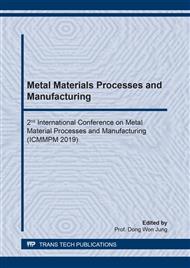p.130
p.139
p.148
p.157
p.163
p.171
p.178
p.184
p.190
Back Propagation Artificial Neural Network Approach to Predict the Flow Stress in Isothermal Tensile Test of Medium Carbon Steel Material
Abstract:
Isothermal tensile test of medium carbon steel material was conducted on a computer controlled servo-hydraulic testing machine at the deformation temperatures (923 to 1223 K) and the strain rates (0.05 to 1.0 s-1). Using the experimental data, the artificial neural network (ANN) model with a back-propagation (BP) algorithm was proposed to predict the hot deformation behavior of medium carbon steel material. For the model training and testing purpose, deformation temperature, strain rate and strain data were considered as inputs and in addition, the flow stress data were used a targets. Before running the neural network, the test data were normalized to effectively run the problem and after solving the problem, the obtained results were again converted in order to achieve the actual data. According to the predicted results, the coefficient of determination (R2) and the average absolute relative error between the predicted flow stress and the experimental data were determined as 0.997 and 0.913%, respectively. In addition, by evaluating each test conditions, it was found that the average absolute relative error based on an ANN model varied from 0.55% to 1.36% and moreover, the results showed the better predictability compared with the measured data. Overall, the trained BP-ANN model is found to be much more efficient and accurate by means of flow stress prediction with respect to the experimental data for an entire tested conditions.
Info:
Periodical:
Pages:
163-168
DOI:
Citation:
Online since:
February 2020
Authors:
Price:
Сopyright:
© 2020 Trans Tech Publications Ltd. All Rights Reserved
Share:
Citation:


